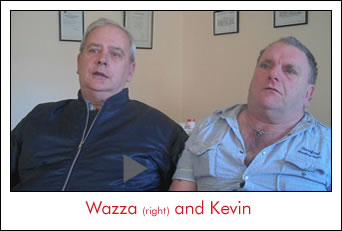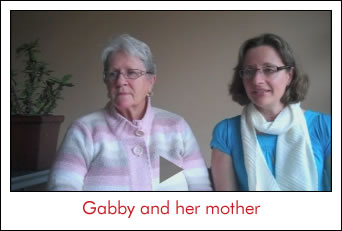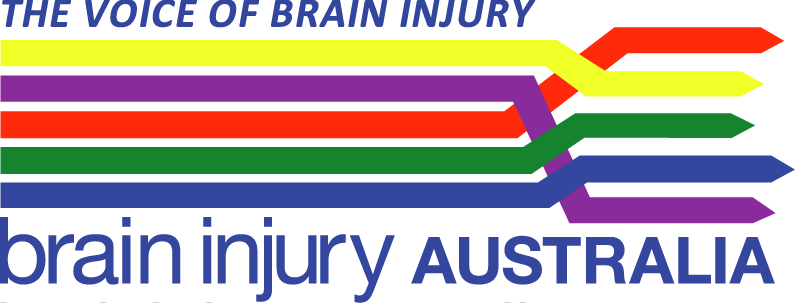- MODULE 2: Working with ABI
- Introduction
- Take the Pre-test
- A. Uniquely building independence
- a) Unique
- b) Injury-Effect-Behaviour
- c) Frontal lobe proxy
- d) Change happens
in the day to day - e) A life span view
- f) Person centred, Goal directed
- B. Through emotions and relationships
- g) Person with ABI
- h) Family members
- i) Grief and loss
- j) Support workers
- k) Managers and Team leaders
- l) Case managers
- m) Professional boundaries
- C. With services
- n) Pathways
- o) Part of a team
- p) The services network
- D. Principles and standards
- q) Principles and standards
- E. Integration
- r) Practice tools
- s) Case study
- t) Further learning
- Take the Post-test
a) Uniqueness of the individual 
i) Unique individuals
All people are unique individuals.
Yet the most important message for people
working with people with an acquired brain injury is:
people with an acquired brain injury are unique individuals.
So what is going on?
When working with people we usually make assumptions:
- If you have the flu you assume that you will have a fever, aches and pains, a week off work ...
- If there has been a bereavement in a family you assume that there will be a grief process possibly including denial, shock, anger .... acceptance...
- If you are working with a person with an intellectual disability you assume that the disability will be maintained for life...
A person with an ABI has a brain injury. What can you assume? Not much.
- People have injuries to different parts of the brain. So the effects of the injury will be different from one person to another.
- Even where two people have a similar injury to the same part of the brain the effects can be different.
- How people emotionally respond to what has happened to them will be different from one person to the next and the process is not typically linear.
Rules of thumb
1. Don't make assumptions:
- When someone slurs their speech or can't speak well don't assume they are not thinking well. Question a little deeper.
- When someone presents well and seems to be functioning well don't assume they are. Question a little deeper.
2. Get to know the person both over time and also for a period of time. See how they are when they are fatigued.
One worker said:
ABI is often a hidden disability. The person seems the same. They look the same as they did before. They may chat for ten minutes and nothing seems to be wrong - but after half an hour the deficits become clear.
ii) Wazza has an ABI (10 mins)
Wazza was in a car accident about 30 years ago. He was in hospital for a number of years. He has mobility and memory problems. He can't walk for long periods. He now lives in supported accommodation with another person Phil who also has a brain injury. He gives talks in the community to educate people about the impact of driving offences causing accidents.
Answer the following question?
Speech - separates words.
Difficulty with mobility - paralysis of right side and leg
Lives in supported accommodation
Difficulties with activities - e.g. bringing washing basket down the stairs, cooking (but can get the ingredients out).
Memory loss particularly with non-routine things.
Things need to be ordered, just so (his house mate is similar). Structure is very important to him.
Committed to getting the message about car accidents and brain damage and its consequences to others.
iii) Alana's Story (13 mins)
Alana had a serious accident aged 14. It happened after she arrived home on the school bus. She got hit by a car right in front of her house. She was taken by helicopter to the Children’s Hospital at Westmead. She was in a coma. She spent three very difficult months in hospital. She went home and did a lot of work on rehabilitation. She completed her HSC. Four years after the accident she was studying at TAFE and doing volunteering in aged care. She lives with her parents and sisters.
- Donna, Alana’s mother
- Mikaela, Alana’s sister
- Justine, Alana’s community support worker and service coordinator
- Liz, Alana’s case manager
Answer the following questions
Unique chracteristics
When I’m tired I shake or just in general I shake.
I might get confused.
And it’s harder to walk sometimes.
And I get confused, did I say that already?
Oh, and I forget lots of things.
Support worker characteristics
They needed to be female.
Needed to be age appropriate.
Needed to fit into the community.
At that time Alana didn’t want to be seen with anyone that might look like, you know, she has a brain injury, or anyone that was too much older than herself at the time. Because she just wanted to fit in and she didn’t want people to be aware that she needed a support worker. So, that was the initial assessment and then from there we recruited a team of support workers to provide the support.
Sister's response to support worker
I found care workers very annoying.
I felt that my privacy, my life, they were always there and I didn’t know them.
Like they were in my house and I didn’t know them.
Because I got picked up from school and then I had to come home to a person that I didn’t know.
I had no idea who it was. But some of them were really nice, they were really considerate.
iv) Questions
Answer the following questions:
You are explaining to the staff member that the work will be different from working with aged care clients. What are some of the things you say?
1.
People with acquired brain injury have an injury to the brain. So the effects of the injury will be different from one person to another depending on what part of the brain is injured..
2. Even where two people have a similar injury to the same part of the brain the effects will be different.
3. So your three clients are likely to be very different.
4. People with an acquired brain injury had a life before the injury. Their life is different now. Working through grief and loss is part of the process of reconstructing their life.
5. People with an acquired brain injury will continue to develop their skills and abilities. Working with them is about increasing their independence. It is important to work with them in building their independence not just do things for them.
6. To work effectively with them you will need to understand their injury, the effect it has had, impairments they may have as a result of the injury and specific strategies for supporting people with these impairments.



